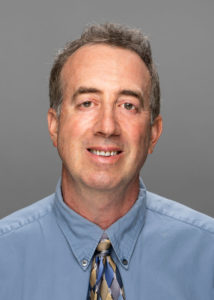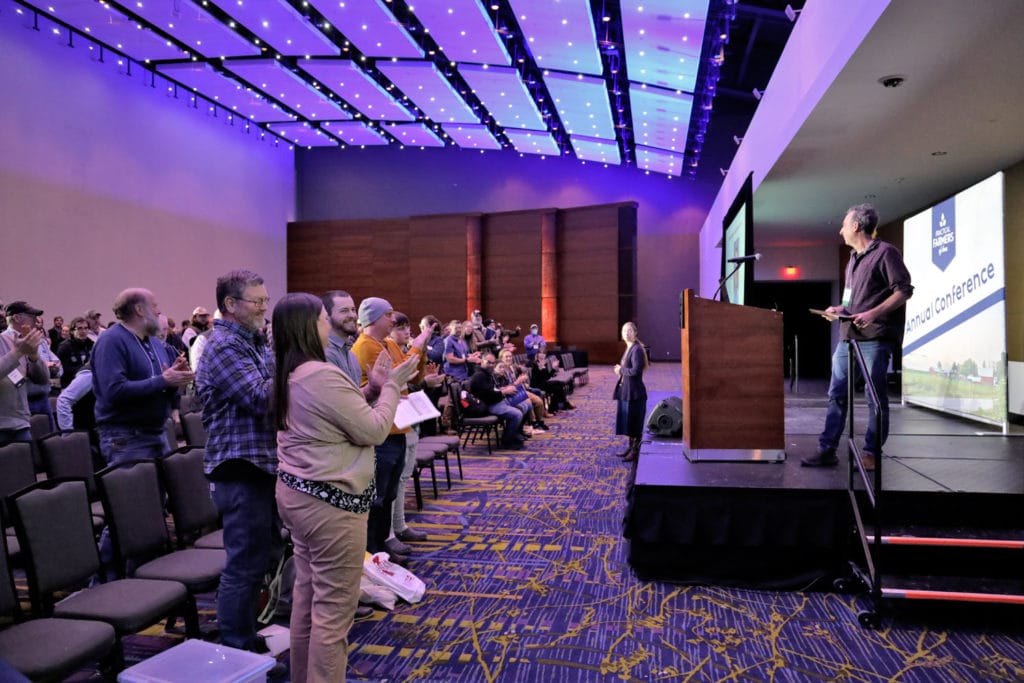A Calling to Teach

Joel Gruver has been teaching and researching for nearly two decades at Western Illinois University.
Throughout his career, Joel Gruver has sought to deepen his knowledge of sustainable agriculture and share it with others.
In the realm of agricultural research, Joel Gruver is something of a household name.
A prolific on-farm researcher, he’s well-known in farmer circles thanks to his equally prolific outreach. Over the course of his long career in agriculture – which includes nearly two decades of teaching and research at Western Illinois University in Macomb, Illinois – Joel has shared his insights at hundreds of farmer meetings across the country.
“I have spoken at somewhere between 400 to 500 farmer meetings since the mid-1990s,” Joel says. “It has been part of my identity, that I do lots of outreach.”
This generous sharing has earned him a reputation as a trusted source of information. A consummate teacher, Joel is known to both farmers and his students for being approachable, innovative and committed to sharing what he’s learned.
Since 2007, Joel has been on the faculty at WIU, where he teaches several undergraduate courses each year in soil science, sustainable agriculture, conservation and agronomy.
He also manages the university’s Allison Organic Research & Demonstration Farm, where he oversees nearly a dozen large-scale, replicated on-farm research projects each year. These studies have explored a range of practical questions related to organic farming, weed control, soil health, crop hybrids and varieties, planting dates and more.
“Our overall goal is to conduct practical research that will benefit organic grain farmers, but also conventional farmers who are interested in enhancing soil health, crop diversification and reduced input costs,” Joel says.
Cover crops have featured prominently in Joel’s research. During his time managing the farm, Joel has expanded the farm’s use of cover crops and explored many questions related to integrating cover crops into production systems. This research focus has earned him a reputation as something of a cover crop guru.
“Joel is committed to education and innovation,” says Mark Quee, farm manager at Scattergood Friends School in West Branch, Iowa, and a recent PFI board member (his board service ended in February). “When a row crop farmer experimenting with cover crops asks, ‘Have we tried this?’ the answer is that Joel is currently doing so or is willing to start.”
In January, Joel received PFI’s 2024 Sustainable Agriculture Achievement Award for this dedication to teaching and research in service of a more sustainable landscape. The award is given each year by PFI to an individual or couple that has shown exemplary commitment to sustainable agriculture, generously shared their knowledge with others and been influential in efforts to foster vibrant communities, diverse farms and healthy food.
Presenting Joel the award during PFI’s 2024 Annual Conference, Mark said: “It’s Joel’s dedication to building human relationships that will inspire all of us to make our farms, our communities and our world more joyful and resilient.”
Shaped By a Wild Land
Joel was born in Baltimore, but spent considerable time exploring the 15-acre farm his parents purchased north of the city when he was 6 years old.
The farm – formally called Honeycomb Farm but which Joel later affectionally referred to as Gruver Land – was foundational to his identity. A land of wild beauty, it was the setting for family adventures and togetherness throughout Joel’s childhood and adult life.
“It was a beautiful piece of land with big trees, streams and rocks – a wild area surrounded by lots of other farmland,” he says. “My brother, sister and I explored the land all the time.”
His parents, whom Joel describes as part of the back-to-the-land movement, were passionate beekeepers who found endless joy in tending their bees – photographing them, harvesting their honey, studying their personalities.
Each hive had a name, Joel says, with descriptive monikers that reflected some aspect of the bees’ history or personality. “One of the hives was Bee Tree. We had that one for probably a decade,” Joel says. “And we had Apple Blossom.” When the colony died, the hive names were respectfully retired.
“My becoming interested in nature, soil, just having a language of the land – that all came from the way my parents introduced us to nature.” -Joel Gruver
Joel’s parents, Arthur and Barbara, also shared their love of nature with Joel and his siblings. His parents planted hundreds of trees and other plants to improve the farm’s habitat. Energized by the work, they kept a daily flower journal. Joel recalls many family hikes to see what flowers were in bloom and which plants the bees were foraging on.
“My parents introduced us to the plants and animals as our neighbors, just like the surrounding farms,” Joel says. “That really was very formative for who I am today. My becoming interested in nature, soil, just having a language of the land – that all came from the way my parents introduced us to nature.”’
Charting a Path to Agriculture
The family land also gave Joel a window into farming as a vocation. As a teenager through his first year in college, he worked on a neighbor’s cow-calf farm, where he learned about rotational grazing and developed an interest in grazing systems.
Joel assumed he’d have some sort of career in farming but wasn’t sure how. He decided to get his bachelor’s degree in chemistry from Principia College in Elsah, Illinois. “I saw chemistry as a toolbox, a way to understand the world,” Joel says.
After graduating, he got a job managing a CSA vegetable farm and sheep flock at Hampshire College in Amherst, Massachusetts. He credits his time there with showing him a pathway to an agriculture-focused career.
Joel enrolled in a master’s program in agronomy at University of Maryland, where he studied under internationally known soil scientist Ray Weil. He read extensively about sustainable agriculture and found himself at the nexus of several sustainable agriculture organizations, including the Northeast Organic Farming Association and the Pennsylvania-based group PASA.
“I started becoming aware of the movements and organizations of farmers that were interested in organics and tackling all the different elements of sustainability,” Joel says.
After earning his master’s degree, Joel moved to Raleigh, North Carolina, to manage the University of North Carolina’s Center for Environmental Farming, staying on to earn his doctorate in soil science. It was there that Joel met his late wife, Lisa Stocking Gruver – who later also studied under Ray Weil.
Joel and Lisa married in 2006, shortly before moving to Macomb. “She was somebody who basically immediately started transforming this community,” Joel says.
In Macomb, Lisa joined a range of civic, environmental and local foods-focused organizations. Joel often participated, extending his outreach and teaching into his personal life.
One such effort was The Nature Quilt Project, an organization Lisa started after learning that children in Macomb knew more about rainforests than prairies and local ecosystems. The initiative, which Joel was involved with, blended art and science to create ecology-themed quilts.
“We would bring science experts to elementary schools and provide books related to science and nature,” Joel says. “Each quilt had a book that was the source of the art.” After Lisa’s sudden death in 2012, Joel eventually loaned the quilts to the Leopold Landscape Alliance in Burlington, Iowa, where they now hang in Aldo Leopold’s house.
Broadening the Field
After taking over managing WIU’s Allison farm, Joel says he got a crash course in Midwestern organic agriculture. He credits one of the farm’s technicians, Andy Clayton, with helping him learn some of the fundamentals of actually farming those crops.
“I had done corn and soybean research before, but I wasn’t growing the corn and soybeans. I was sampling them,” Joel says. “I had to learn all aspects of planting, mechanical weed control and spreading large quantities of manure. Andy was fundamental in teaching me how to do those things.”
Through his ongoing affiliation with PASA, Joel learned of PFI. In 2007, he became a PFI member and has since spoken at various PFI events. He also regularly engages with farmers on PFI’s email discussion groups, sharing research from his on-farm trials or adding to conversations.
As he looks to the future, Joel is excited about the new crop of students he’ll be guiding to a better understanding of sustainable agriculture. He’s also excited about on-farm trials at the Allison farm looking at how to make the most of cover crops.
One trial is exploring solar corridors, where cover crops are planted between wider-set crop rows. Another is looking at letting cover crops grow for a whole year, something Joel calls “regenerative years.”
In between teaching and research, it’s certain Joel’s calendar will be filled with travel – to share what he’s learned and get ideas for new on-farm trials.
“It’s my way of life. Building learning communities is what I try to do in all the different types of outreach I do,” he says. “I’m trying to not just tell people something, but create a relationship where we keep learning together.”

